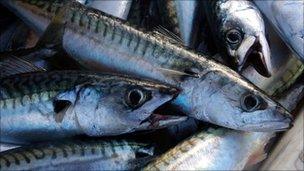Faroes and Iceland urged to back down over mackerel
- Published

The wrangle is over controversial Icelandic and Faroese mackerel catches
The Faroes and Iceland have been urged to back down over the ongoing mackerel dispute.
The wrangle began when the Faroes and Iceland declared increased catches of mackerel, which it is claimed threatens stocks as well as the Scottish fleet.
Scottish Conservative MEP Struan Stevenson is in the islands to meet fishing industry leaders, and offered an "olive branch".
And UK fisheries minister Richard Benyon also called for a settlement.
Mr Stevenson was dispatched by the European Parliament's fisheries committee.
He said: "I sincerely hope that we can resolve this dispute through negotiation, although given that Iceland has already admitted catching 75% of its massively-increased quota, extreme urgency is now required to prevent a catastrophe in mackerel stocks.
"I have argued throughout this dispute that we need to negotiate from a position of strength, using the possibility of a blockade of Icelandic and Faroese fishing boats as a bargaining tool.
"Some have said this threatens jobs in Scotland, but Iceland and the Faroes have far more to lose, as their economies are heavily dependent on fishing. Of course, we will all suffer if the mackerel fishery is destroyed."
He added: "I am more than willing to extend the olive branch, but they must know that we mean business."
'Realistic settlement'
Mr Benyon said of the quotas: "This is unacceptable behaviour that places a substantial burden on the fishery and could seriously undermine its long-term sustainability.
"I urge both Iceland and the Faroe Islands to negotiate to reach a fair and realistic settlement."
A Faroese vessel, Jupiter, was blockaded by Peterhead fishermen last month.
They were angry that boats from the Faroes and Iceland are fishing much larger amounts of mackerel in their own waters and trying to land them in Scotland.
Last year mackerel brought £135m into the economy, making it the Scottish fleet's most valuable fish.
- Published6 September 2010
- Published30 August 2010
- Published24 August 2010
- Published18 August 2010
- Published17 August 2010
- Published10 August 2010